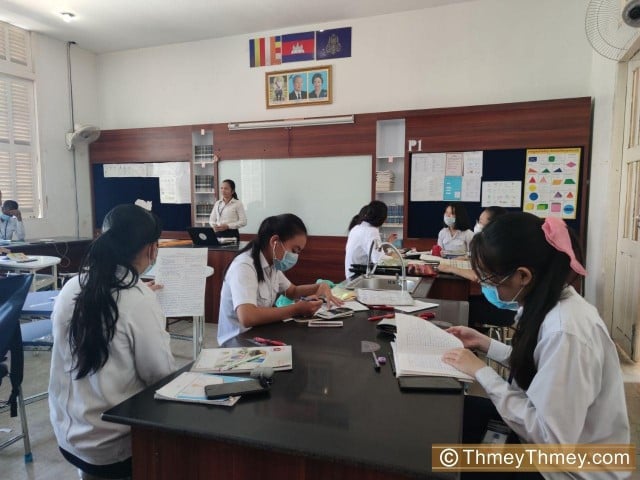Opinion: Benefits and Risks of ChatGPT in Education

- By Sarin Sok
- February 15, 2023 11:10 AM
The interest in artificial intelligence (AI) tools in education has significantly grown among educators and students.
Many AI tools are accessible in Cambodia, particularly in educational settings. ChatGPT is probably one of the leading emerging AI tools in education and is used to generate essays, summarize texts, answer a wider range of queries, chat with friends, translate languages, correct grammar mistakes and much more.
Though ChatGPT has not been made available in Cambodia, some students still find ways to access it. While incorporating ChatGPT into the teaching and learning process can allow students and educators to gain many advantages, there are drawbacks.
This essay discusses the opportunities and challenges of integrating ChatGPT in higher education in Cambodia, as well as provides suggestions for practice.
Opportunities
To begin with, ChatGPT can enable students to get acquainted with up-to-date technology through its interactive chatbot platform. One of the common applications of ChatGPT is a chatbot which can give students real-time access to the latest technology trends and tutorials.
It is worth noting that college students may need to familiarise themselves with such an emerging technological advancement which massively benefits both their studies and future career.
Second, a number of ChatGPT features give students the chance to improve their writing skills. In this sense, it is good for students to suggest academic words, phrases, and sentence structures that are academically appropriate for a specific context through a chatbot in addition to checking and correcting grammar errors, aiding students in their writing.
This suggests that students should continue proofreading and editing their work, which is essential for advancing their writing abilities.
Third, while ChatGPT has the potential to foster classroom engagement and collaboration through a variety of integrative learning games, its integration is far from simple. For it to be successful, educators are required to not only be more flexible and tech-savvy but also be familiar with the technology and willing to invest the time and effort needed for successful implementation.
Furthermore, there is no guarantee that students will become engaged and motivated to learn as their receptiveness to technology may vary. As such, the efficacy of ChatGPT as a teaching and learning tool remains to be seen.
Finally, it is convenient for educators and faculty members to integrate ChatGPT for assessments. It can be argued that assessment is the cornerstone of quality assurance which is needed for measuring students’ learning progress – possibly motivating students’ learning.
In this regard, ChatGPT enables educators and academic members simply and quickly generate many types of questions, namely true/false, multiple-choice, open-ended questions and more so they might take focus on teaching rather than spending time designing assessments.
That being said, it is essential for educators to be aware of the potential limitations of AI. Thus, critically considering the pros and cons of using ChatGPT for learning assessment and ensuring its equitable use before relying on it as a primary means of assessment is critical.
Furthermore, with the assistance of ChatGPT, teachers can provide timely and constructive feedback to students, following strengths, weaknesses, and areas of improvement. It is believed that formative feedback is a potential tool for improving learners’ performance.
Challenges
With that being said, the usage of ChatGPT in Cambodian higher education potentially brings challenges. Firstly, with the presence of ChatGPT, plagiarism amongst students possibly exists – leading to academic misconduct.
It is accepted that introducing such a break-grounding AI tool in higher education may seem beneficial, but are Cambodian higher education institutions ready for it? Are academic staff members and educators competent enough to prevent plagiarism?
This is a key to critically consider before making this tool accessible in the context of Cambodian higher education. If ignored, students potentially cheat on assessments which leads to the second challenge.
The move towards utilizing ChatGPT in educational assessment poses significant ethical concerns since it possibly results in unfair assessments that could have a harmful effect on students.
In the context of Cambodia, academic results may be considered the first priority for students. In this sense, students may be incentivized to use AI-generated content in their assignments and projects to score higher than their peers – making assessors or educators encounter difficulties in identifying whether the work is done by students or AI.
If it happens, many students, if not all, could lose motivation and trust in both educators and academic institutions. This could have a fundamental impact on the quality of education and thereby should be addressed through rigorous oversight and evaluation of AI-generated content.
Last but not least, this emerging AI tool could restrict students from developing their critical and analytical thinking abilities.
With ease offered by ChatGPT, students may become solely dependent on this tool and struggle to develop the necessary skills to evaluate and analyze information. As a result, it is vital to make sure this use of AI tools is combined with thoughtful instruction and guidance to help students develop their critical and analytical thinking skills – pivotal for 21st-century education.
ChatGPT has the potential to present many advantages to the teaching and learning process in Cambodia, particularly in higher education.
That said, it is important to analytically consider the possible drawbacks of integrating ChatGPT and ensure its equitable use to guarantee education quality and prevent academic misconduct. Educators and academic staff should guarantee that students do not primarily rely on ChatGPT and that they are also given the opportunity to develop their analytical and critical thinking skills.
Sarin SOK is a Chevening scholar, pursuing an MA in Education (Technology-Enhanced Learning) in the United Kingdom.















